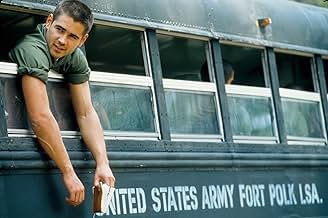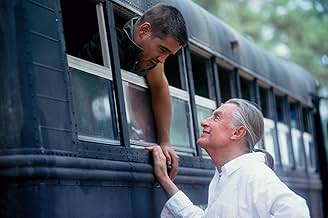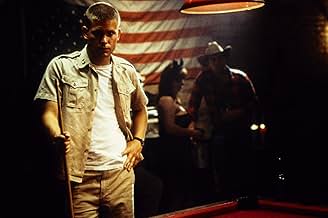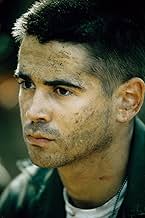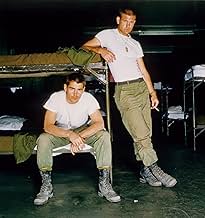PUNTUACIÓN EN IMDb
6,9/10
45 mil
TU PUNTUACIÓN
Un grupo de reclutas pasa por el Entrenamiento Avanzado de Infantería en Fort Polk, última parada antes de Vietnam para miles de jóvenes en 1971.Un grupo de reclutas pasa por el Entrenamiento Avanzado de Infantería en Fort Polk, última parada antes de Vietnam para miles de jóvenes en 1971.Un grupo de reclutas pasa por el Entrenamiento Avanzado de Infantería en Fort Polk, última parada antes de Vietnam para miles de jóvenes en 1971.
- Dirección
- Guión
- Reparto principal
- Premios
- 2 premios y 5 nominaciones en total
Tom Guiry
- Pvt. Cantwell
- (as Thomas Guiry)
James MacDonald
- Staff Sgt. Thomas
- (as James McDonald)
Reseñas destacadas
American military authority is the enemy for Pvt. Roland Bozz (Colin Farrell), a nonconformist trainee who, along with other infantry trainees, endures brutal, sadistic treatment in preparation for combat in Vietnam. Tigerland is a swampy, steamy camp near Fort Polk, Louisiana that is supposed to simulate conditions in Vietnam. The story is set in 1971.
The amount and severity of physical and verbal aggression displayed in this film may be a tad overstated. But the point the film is making is that many, if not most, of the young guys drafted into the army in the late 60s and early 70s absolutely did not want, or deserve, to be there.
Roland Bozz is one of those young men. He's angry at the war, angry at the army. The army won't release him because they know that's what he wants. If Bozz can't get himself out, the next best thing is to try and get other recruits out. That will be his revenge, his way to fight the system.
A fellow trainee shares his background with Bozz, who then tells the trainee: "I know army regulations the way prisoners know the law. You're a hardship discharge, man, if ever I saw one. Okay. I'll get you out of the army". Bravo for Roland Bozz, a young rebel with a mission, a cause, trapped like the others by an oppressive, controlling institution.
Acting is very, very good. Colin Farrell is terrific, at a time when he, and the rest of the cast, was largely unknown. No need for overpaid A-list actors. The film's acting style trends naturalistic, spontaneous, and emotionally intense. None of the acting seems forced.
With a hand-held camera, combined with grainy film stock, and using quick zooms and unexpected cuts, the cinematography and editing convey a documentary look and feel, which results in sequences that are quite realistic. Lighting is mostly natural. Sets are plain and unadorned. Background music is minimal.
Much better than I ever expected, "Tigerland" is a well-made film with an intense, anti-war theme. It's about putting others ahead of one's own selfish interest. That Hollywood largely shunned this low-budget film is all the more reason to see it.
The amount and severity of physical and verbal aggression displayed in this film may be a tad overstated. But the point the film is making is that many, if not most, of the young guys drafted into the army in the late 60s and early 70s absolutely did not want, or deserve, to be there.
Roland Bozz is one of those young men. He's angry at the war, angry at the army. The army won't release him because they know that's what he wants. If Bozz can't get himself out, the next best thing is to try and get other recruits out. That will be his revenge, his way to fight the system.
A fellow trainee shares his background with Bozz, who then tells the trainee: "I know army regulations the way prisoners know the law. You're a hardship discharge, man, if ever I saw one. Okay. I'll get you out of the army". Bravo for Roland Bozz, a young rebel with a mission, a cause, trapped like the others by an oppressive, controlling institution.
Acting is very, very good. Colin Farrell is terrific, at a time when he, and the rest of the cast, was largely unknown. No need for overpaid A-list actors. The film's acting style trends naturalistic, spontaneous, and emotionally intense. None of the acting seems forced.
With a hand-held camera, combined with grainy film stock, and using quick zooms and unexpected cuts, the cinematography and editing convey a documentary look and feel, which results in sequences that are quite realistic. Lighting is mostly natural. Sets are plain and unadorned. Background music is minimal.
Much better than I ever expected, "Tigerland" is a well-made film with an intense, anti-war theme. It's about putting others ahead of one's own selfish interest. That Hollywood largely shunned this low-budget film is all the more reason to see it.
TIGERLAND
Aspect ratio: 1.85:1
Sound format: Dolby Digital
Louisiana, 1971: During basic training, a rebellious army conscript (Colin Farrell) causes dissension within the ranks.
Given Joel Schumacher's reputation as a schlockmeister par excellence, most critics were caught off-guard by this low-budget drama, filmed without any of the frills and fripperies normally associated with Hollywood blockbusters, and headlined by little more than obscure (but hugely experienced) character actors and talented newcomers, including Farrell, whose bravura performance launched him to international stardom. Far removed from the extravagant Vietnam-operas favored by Francis Ford Coppola and Oliver Stone, Schumacher's film examines the contradictions of war and the dehumanizing effect of combat on ordinary men through the experiences of Farrell's anti-hero, a compassionate man who despises the self-serving patriotic nonsense peddled by his superiors, and who refuses to compromise his own ideals, despite the sometimes painful repercussions of his disobedience.
Though backed by a major studio, TIGERLAND has the look and feel of a low-budget indie production, using hand-held camera-work and grainy film-stock for documentary effect, and this uncompromising 'Dogme'-like approach allows Schumacher to focus his attention on the characters and their situation rather than the pyrotechnics which usually dominate such movies. Farrell may be the star of the show, but he's matched by debut actor Matthew Davis (BLOODRAYNE) as his closest friend and fellow combatant, an aspiring writer who volunteered for duty and who favors intellect and reason over Farrell's reckless bravado. Fine supporting cast, excellent technical credits.
Aspect ratio: 1.85:1
Sound format: Dolby Digital
Louisiana, 1971: During basic training, a rebellious army conscript (Colin Farrell) causes dissension within the ranks.
Given Joel Schumacher's reputation as a schlockmeister par excellence, most critics were caught off-guard by this low-budget drama, filmed without any of the frills and fripperies normally associated with Hollywood blockbusters, and headlined by little more than obscure (but hugely experienced) character actors and talented newcomers, including Farrell, whose bravura performance launched him to international stardom. Far removed from the extravagant Vietnam-operas favored by Francis Ford Coppola and Oliver Stone, Schumacher's film examines the contradictions of war and the dehumanizing effect of combat on ordinary men through the experiences of Farrell's anti-hero, a compassionate man who despises the self-serving patriotic nonsense peddled by his superiors, and who refuses to compromise his own ideals, despite the sometimes painful repercussions of his disobedience.
Though backed by a major studio, TIGERLAND has the look and feel of a low-budget indie production, using hand-held camera-work and grainy film-stock for documentary effect, and this uncompromising 'Dogme'-like approach allows Schumacher to focus his attention on the characters and their situation rather than the pyrotechnics which usually dominate such movies. Farrell may be the star of the show, but he's matched by debut actor Matthew Davis (BLOODRAYNE) as his closest friend and fellow combatant, an aspiring writer who volunteered for duty and who favors intellect and reason over Farrell's reckless bravado. Fine supporting cast, excellent technical credits.
This movie is done on a low budget. It looks like they used the actual government training center, and many parts were realistic. A few parts of the movie were over the top. This movie is fresh, and gritty; I like the realism of the film. The hero or anti hero is a nice guy, in wolf's skin. (I've met people like him) It shows how cruel the system can be and the merits of playing by your own rules. In the end I like this film.
It is certainly interesting to write a review about a film that took place where I actually resided for two months. In September of 1971 when this film is set, your's truly was doing his basic training at Fort Polk, Louisiana. I did get to the North Fort at one point in my training where the infamous Tigerland was located. In fact Tigerland was a nickname given to the whole northern part of the army base.
I was doing the basic training to be a weekend warrior and avoid Vietnam. But I saw so many of the kids who were just like the ones portrayed in the film it was actually a rather nerve wrecking old home week. In 1971 everyone except the policy makers in Washington knew that this was going to end when as Senator George Aiken declared, we said we won and then went home. And of course the South Vietnamese government we were protecting would fold like a napkin.
By that time the army was scraping the bottom for soldier material and you can see it in the company of men that are in Tigerland. This is where more soldiers shipped for Vietnam than any other place in the nation. The Louisiana swamps best approximated the climate conditions of Vietnam.
This particular company has a real odd ball in it with Colin Farrell. He's doing his best to get out of the army, but the army just won't oblige him. So he's waging his own war against them by becoming a 'barracks lawyer' and getting others out. And he's driving the officers and NCOs quite nuts doing it.
I would rate Tigerland a lot higher because there is much I liked about the film. It was not shot at Fort Polk, but in places that gave you feel of the place. What I remember best about it was rain and mud. In that summer of 1971 it rained nearly every single day I was there. But the rain and sometimes it would come a few times a day. Would be a sudden downpour, maybe at most 20 minutes then it would cool off and then resume being muggy. And the ground couldn't absorb it fast enough so it was always muddy. You did your best work in that brief period after rain stopped it was then actually decent enough for normal activities.
What I couldn't quite grasp was Colin Farrell's motivations for what he was doing. I blame that on the writer and also the director.
As for the other players the best in the cast was Thomas Guiry playing this poor sad sack kid from the Louisiana bayous. I met a few just like him, he stopped his formal education at the 6th grade. It was a touching performance on Guiry's part.
So here's to Fort Polk, not a place I recommend, but sometimes a place which is needed to train our soldiers. It got a good film, but not a great one in its honor.
I was doing the basic training to be a weekend warrior and avoid Vietnam. But I saw so many of the kids who were just like the ones portrayed in the film it was actually a rather nerve wrecking old home week. In 1971 everyone except the policy makers in Washington knew that this was going to end when as Senator George Aiken declared, we said we won and then went home. And of course the South Vietnamese government we were protecting would fold like a napkin.
By that time the army was scraping the bottom for soldier material and you can see it in the company of men that are in Tigerland. This is where more soldiers shipped for Vietnam than any other place in the nation. The Louisiana swamps best approximated the climate conditions of Vietnam.
This particular company has a real odd ball in it with Colin Farrell. He's doing his best to get out of the army, but the army just won't oblige him. So he's waging his own war against them by becoming a 'barracks lawyer' and getting others out. And he's driving the officers and NCOs quite nuts doing it.
I would rate Tigerland a lot higher because there is much I liked about the film. It was not shot at Fort Polk, but in places that gave you feel of the place. What I remember best about it was rain and mud. In that summer of 1971 it rained nearly every single day I was there. But the rain and sometimes it would come a few times a day. Would be a sudden downpour, maybe at most 20 minutes then it would cool off and then resume being muggy. And the ground couldn't absorb it fast enough so it was always muddy. You did your best work in that brief period after rain stopped it was then actually decent enough for normal activities.
What I couldn't quite grasp was Colin Farrell's motivations for what he was doing. I blame that on the writer and also the director.
As for the other players the best in the cast was Thomas Guiry playing this poor sad sack kid from the Louisiana bayous. I met a few just like him, he stopped his formal education at the 6th grade. It was a touching performance on Guiry's part.
So here's to Fort Polk, not a place I recommend, but sometimes a place which is needed to train our soldiers. It got a good film, but not a great one in its honor.
I thoroughly enjoyed this movie, but it is nothing new.
Everyone here is grouping it with other war movies, this movie has been miscategorized! Its not a war movie any more than "One flew over the cuckoos nest" is a asylum movie or "Cool Hand Luke" is a prison movie. This is a movie about individuality, nonconformity, self-confidence and the costs of that personality type.
The plot is the same as "One flew over the Cuckoos nest" and "Cool Hand Luke", its in GOOD company, and it holds its own. Its these movies it should be held up against and compared, not "Apocalypse Now" or "Platoon".
Eric
Everyone here is grouping it with other war movies, this movie has been miscategorized! Its not a war movie any more than "One flew over the cuckoos nest" is a asylum movie or "Cool Hand Luke" is a prison movie. This is a movie about individuality, nonconformity, self-confidence and the costs of that personality type.
The plot is the same as "One flew over the Cuckoos nest" and "Cool Hand Luke", its in GOOD company, and it holds its own. Its these movies it should be held up against and compared, not "Apocalypse Now" or "Platoon".
Eric
¿Sabías que...?
- CuriosidadesThe actors had no trailers, make-up artists, hairstylists, chairs or any of the typical luxuries.
- PifiasWhen Bozz brings the truck to a screeching halt with the can in the exhaust pipe, a modern clear plastic water bottle rolls across the truck floor.
- Banda sonoraSound Off
Written by Willie Lee Duckworth and Bernard Lentz
Selecciones populares
Inicia sesión para calificar y añadir a tu lista para recibir recomendaciones personalizadas
- How long is Tigerland?Con tecnología de Alexa
- Why wasn't Wilson court-martialled right after his first crime?
- Why did Wilson start fighting with Bozz?
Detalles
- Fecha de lanzamiento
- Países de origen
- Idioma
- Títulos en diferentes países
- Camino de guerra
- Localizaciones del rodaje
- Empresas productoras
- Ver más compañías en los créditos en IMDbPro
Taquilla
- Presupuesto
- 10.000.000 US$ (estimación)
- Recaudación en Estados Unidos y Canadá
- 139.692 US$
- Fin de semana de estreno en EE. UU. y Canadá
- 26.715 US$
- 8 oct 2000
- Recaudación en todo el mundo
- 148.701 US$
- Duración1 hora 41 minutos
- Color
- Mezcla de sonido
- Relación de aspecto
- 1.85 : 1
Contribuir a esta página
Sugerir un cambio o añadir el contenido que falta

Principal laguna de datos
By what name was Tigerland (2000) officially released in India in English?
Responde



